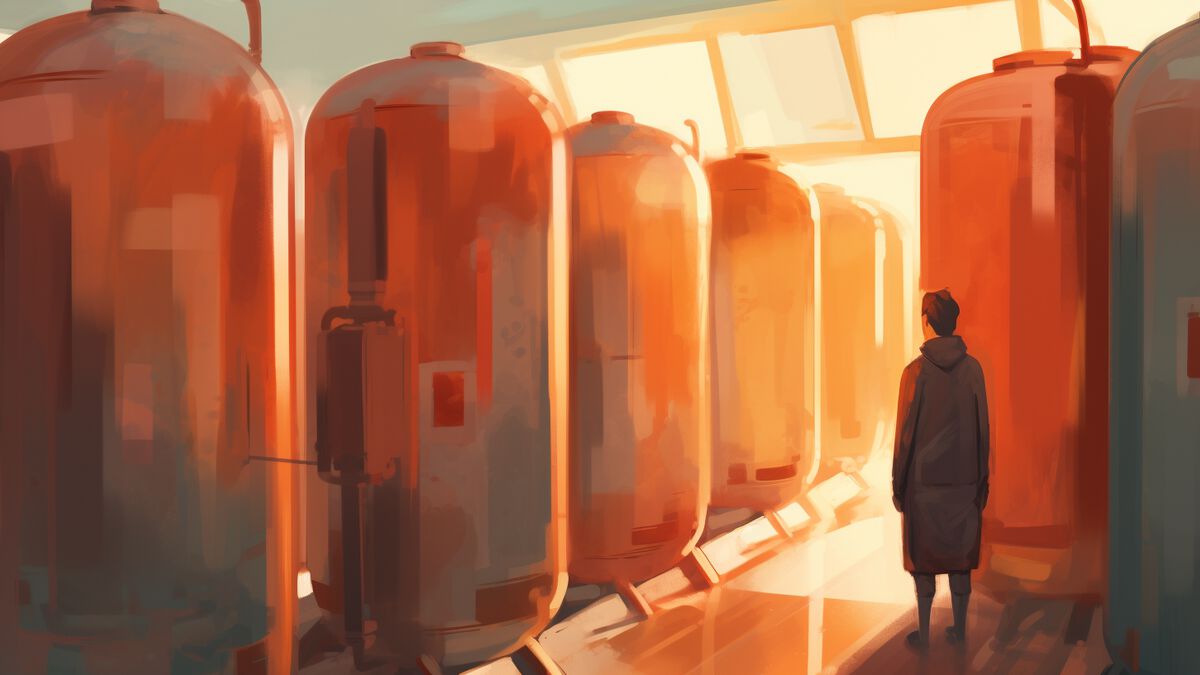Cryonics and Transhumanism Are Hope for Life
Lincoln Cannon
16 March 2018 (updated 3 January 2026)
Infamously, cryonics is in the news again. The Brain Preservation Foundation announced that a research group has successfully preserved a pig brain at a research-grade level of detail. A startup, Nectome, announced that it’s aiming to sell brain-destructive connectome preservation. And of course, all-too-predictably, such news is provoking frothy-mouthed bio-conservatives to vilify such endeavors and the Transhumanist ideology as a whole, as a sort of incoherent egotistical deathism.
Georgi Boorman’s article for The Federalist is case in point. The subtitle states her position: “Transhumanism is a religion of self, embedded with the doctrine of sola feels, all bundled into one medical procedure that literally ends your life.”
It would probably be too much to expect of Georgi, or the many others who vilify Transhumanism with such enthusiasm, that she pause for a moment to ask herself whether Transhumanism is in fact essentially selfish, as she insists. Sure. There are plenty of selfish Transhumanists, as there are plenty of selfish bio-conservatives and plenty of selfish persons of just about any other ideology. Aren’t almost all of us too selfish? But could Georgi imagine an altruistic Transhumanist? Could she imagine an account of Transhumanism that mandates altruism? Or would it shock her brain into a fatal fit of categorical upheaval? We cannot know. She probably didn’t even try.
It’s sola feels, ironically. Egotism is how Transhumanism feels to her, clearly. And clearly that’s sufficient grounds for her vilification. Because, as we’ll see, whatever other grounds for vilification she might appear to offer through her wavy-handed finger-pointing amount to no more. And I would venture to guess that, in addition to being a bio-conservative, she’s probably also a religious conservative. So she probably knows something about religion. But unfortunately like most religious conservatives, she probably hasn’t reflected much on the similarities between how religion functions in her and how it functions in others. It’s sectarian sola feels. And only all other religions are villains. There’s nothing quite like sectarian religion to provoke a hypocritical frenzy.
Of course, even if I’m wrong about Georgi being religious (which I’m surely not), it would still to some extent be emotionally effective to charge Transhumanists with religiosity. How some “secular” Transhumanists (in their misrecognized antireligious religiosity) hate that! And she probably knows it. She feels it, and feels that others feel it. And that’s why vilification, as an appeal to emotion, so often works. Sola feels, indeed, all around. So, why not? I’ll emote too.
Because it literally ends your life! I can almost imagine Georgi working herself up into red-faced self-righteousness as she pronounces this observation. Cryonics ends your life, like, literally! I’m tempted to wonder whether anyone who’s heard of cryonics before hadn’t already recognized this. Have we all recognized that burial and cremation also end life? They do, at least, if the person being buried or cremated is not already dead. So typically we don’t bury or cremate her until she’s legally dead. And the same goes for cryonics, typically.
Now, of course, Nectome is partly to blame for sensationalizing the matter in this particular case. They probably wanted to be provocative to get press, so they emphasized the obvious: it’s “100% fatal.” And further, they directly and perhaps unnecessarily associated their particular form of cryonics with physician-assisted suicide. Presumably, the reason for this is to minimize the risk of brain deterioration and maximize chances of a high quality preservation.
Established cryonics companies already deal with this issue. And they generally do it without physician-assisted suicide. If a person knows she is going to die, she asks the cryonics company to be ready to act as soon as she’s legally dead. If she doesn’t know she’s going to die then, according to a legal procedure that she had previously established, the cryonics company is notified to act as soon as her death is discovered.
Are there some people who have committed or will commit suicide to facilitate cryonics? Yes. And there are many people who have committed and will commit suicide in response to many other emotional concerns. It’s generally tragic. And it merits serious ethical deliberation. But vilification is not the solution. Seriously. When has vilification ever stopped someone from committing suicide? Give her a reason a live – not another source of suffering.
Maybe Georgi’s aim isn’t actually to stop a few Transhumanists from committing suicide. In fact, it appears her concern may actually be that their suicide wouldn’t be intended as permanent. How dare they?!? Her moral indignation is palpable.
To express her feels, Georgi appeals to the rumination of neuroscientist Michael Hendricks. “Any suggestion that you can come back to life is simply snake oil,” he claimed. I wonder if he ever looks at himself in the mirror in the morning and says the same thing? Are you the same person who went to sleep last night? The atoms have changed. Their positions have changed. The molecules and systems composed of them have changed. Your anatomy has changed dramatically throughout your life, and will continue doing so as long as you live. And, for all you know, aliens replaced you during the night, or the Matrix Architect freshly booted up your memories moments ago. So what do you prefer: the snake oil of the persistent atomic self (for that is clearly snake oil), or the hope that the intermittent dynamic self might endure in some meaningful way?
Further expressing her feels by proxy, Georgi quotes Michael again. “Burdening future generations with our brain banks is just comically arrogant.” Maybe Michael is serious. Maybe he really does think it arrogant to embrace hope of resurrection. And make no mistake. That’s what we’re talking about. We’re talking about resurrection. And Michael is saying the hope is arrogant.
Countless generations of humanity have lived with such hope. Most have placed the burden of their hope on supernatural powers because they could not imagine natural means for such capacity. But nonetheless they hoped, and they imagined others burdened with whatever would be required to realize their hope.
Has the common human hope in resurrection been arrogant? Comically arrogant, even? It certainly could be, for all the same reasons that our living hope can be comically arrogant. But, likewise, for all the same reasons that our living hope can be sublime, so can our hope in resurrection be sublime. Will to life is not in itself good or evil. Life consists of both. It’s how we live and would live that make the difference.
But what of the burden? Is it morally acceptable to put our hope in supernatural powers rather than natural powers? Is it morally acceptable to put our hope in alien powers, some wholly non-human God perhaps, but not in familiar powers, such as our imagined human potential? This question, of course, goes deeply into the controversy over theosis, which religious conservatives love to demonize as much or more than they love to demonize Transhumanism. Should humanity accept the divine calling to take on the name and power of God? Those who hold to such faith are not novel heretics. To the contrary, the doctrine of theosis is ancient and enduring. Jesus, what shall we do? Raise the dead, he charged, and yet greater works.
Michael hopes future generations are appalled by our hopes. I wonder if he’s appalled by the hopes of his ancestors? Maybe he is. In contrast, I find the resurrection hopes of my ancestors inspiring. And I’d be happy to contribute toward their realization. As the Good Book prophesies, the hearts of the children shall turn to the parents and the parents to the children, otherwise the whole world will be wasted. What more obvious turning of hearts could there be than using the education and tools we’ve inherited from the incremental efforts of our ancestors to, in turn, restore them to life? They gave to us. We might give to them. And, in the process, perhaps we may all become God, in pervasive giving and receiving of grace that reflects the grace we’ve all received from creation within a context of opportunity. Surely it’s a burden. But love is always a burden.
Georgi then gets to the heart of her (probably ironic) accusation of Transhumanist religiosity. It’s “more than just cheating clients out of their money.” How so? What could be worse? Well, she tells us. Cryonics is “purely a religious rite,” she says. Religion is worse than cheating people out of money! If Transhumanists weren’t acting on our most strenuous hopes and fears, it wouldn’t be so bad, evidently. But because we’re so serious about it, because we’re religious about it, it’s worse.
Georgi rightly recognizes faith operating among Transhumanists. “Do this deed, and you have a chance at immortality … your act of faith might earn you another life.” It is, as she points out, something of a baptism. And so I wonder, does she offer the same criticism of other baptisms? Does she level the same accusations of arrogance at other rituals and religions? Does she recognize arrogance in her own religiosity? Because surely she’s religious, probably in the traditional conservative sense. But, no, she probably hasn’t considered the hypocrisy of her criticism. It’s probably enough for her, sola feels, that her criticism sounds momentous, even if it’s as old and dusty as sectarian squabbles between Zoroastrians and the Cult of Horus.
Okay. So if the hypocritical appeal to ridicule of religiosity won’t work, how about an appeal to ridicule of self-worth? Georgi goes there. It’s the “height of arrogance,” she claims, to suppose future generations will value the possibility of interacting with a resurrected cryonicist. She should probably see a therapist about this. I say that seriously. Does she think so little of herself? She’s spewing hypocrisy in her article, but I’m sure there are innumerable interesting, valuable, redeemable, and lovable things about her. And even if I don’t know what they are, surely her friends and family know. And that’s the most important point she’s failing to consider.
Resurrection is not inherently about one’s self exclusively. It may be merely egotistical, for some sad minority. But for most persons who hold to such hope, it’s about far more, including the experience of relationships. While some of the more ascetic may imagine a heaven abstracted away from relationships, it seems that the most common conception of heaven is and always has been communal. It’s the hope of another day together with a people, a family, or a friend that one has loved. It’s surely the hope of more experience, but so often also the hope to share that experience with others.
Georgi won’t have it. She wants you to know that “you are, as a matter of fact, quite wretched.” You are a “miserable consciousness.” I wonder if she thinks this about her family and friends? I’m tempted to pity them, as I’m tempted to pity her.
“Transhumanism is about cheating death,” says Georgi. Yes! May we cheat death, and more: may we defeat death! Something inside tells me that Georgi probably revers the Bible. I wonder if she’s read the part where Paul teaches that death is the last enemy that will be vanquished. That, to me, sounds like a Christian mandate to cheat death. Or does she think we should fight death fairly? How would that work? It certainly isn’t fighting us fairly. It just kills, in any way that works. So I’m with Paul. I say we vanquish death, even if we have to cheat it.
“Self-worship evolves to take on more sophisticated, far-fetched forms,” says Georgi. Indeed. There have always been those who would raise themselves above others in sophisticated ways, such as by tearing others down while pretending not to do so. Georgi may not want to work toward giving and receiving resurrection. But will she see how her vilification of Transhumanists is worship of her own values at their expense? Will she see her vilification as a manifestation of sectarian religion, which is just another variation on the theme of the “selfie religion” that she’s hypocritically criticizing?
Continuing to exaggerate her sola feels, Georgi says Transhumanism promotes killing Down Syndrome babies. As it turns out, I know a Transhumanist who recently fathered a Down Syndrome baby and has every intention of nurturing that child to the best of his abilities. She says Transhumanism allows frozen embryos to be made into jewelry. As it turns out, I know many Transhumanists who would be appalled by this. And Georgi continues on down a disgusting slippery slope train wreck of vilification that I won’t repeat further here.
Her point? Again, Transhumanism is egotism. Why? Because she feels so. Because she’s unable to acknowledge or imagine that Transhumanism is more than the straw man she’s constructed. Transhumanists are living or would live at others’ expense, she claims.
But can’t she see? We all, each of us, live at others’ expense always! It’s inescapable. That’s not what constitutes egotism. Egotism is when that reality is ignored or denied. Egotism is when we seek not to share that expense with each other. Egotism is in denying others’ hopes needlessly. Egotism is in rebuking others for what one does one’s self. Egotism is in vilifying others ignorantly or dishonestly.
Georgi only sees cryonics as self-worship. And it may be that in some cases – maybe even in most cases, as again it seems that most of us are too egotistical most of the time. But it can be and generally is also more than egotism, as hope in resurrection-in-general probably is self-worship to some extent but is also rightly regarded by traditional religions as a hope worth revering.
And somehow Georgi sees cryonics as contrary to esteem for the sanctity of life. I suppose she has persuaded herself, as so many traditional religious conservatives have, of an “eternal life” that is merely a euphemism for death. Well, I won’t privilege the sophistry. If you genuinely want others to hold life in the highest esteem, don’t vilify them for seeking to maintain life as long as possible and to restore life when it has been or must be lost. I read the same Bible that the religious conservative reads, and in it I read Jesus telling us to raise the dead. I take him seriously. Why don’t you?
Georgi doesn’t take him seriously, apparently, because death must be the end in this world. Sola feels, apparently. Whatever her faith may be, it’s apparently not compatible with that of those of us who aren’t so cozy with the grim reaper. According to her, we’re “priests and priestesses, huckster cult leaders” of an alien religion. We’re somehow, according to her hypocritical sophistry, encouraging death as a sacrifice to our religion.
But the reality is that we, Transhumanists, love life. Sometimes, even far too often, we love life too egotistically. And we’re not unique in that. All of us, Transhumanists and bio-conservatives alike, can work on greater altruism. But again, it’s altogether wrong, completely false, to portray Transhumanists as advocates of death in any general sense. If anyone is true to life, it is the Transhumanist. And cryonics is one of the many evidences of that faith, our trust, that life is worth more life – even if we must sleep from time to time.



